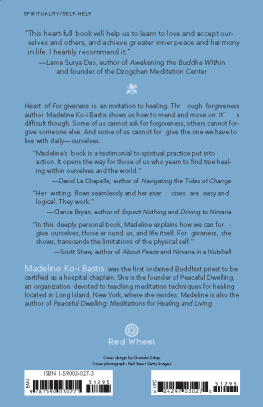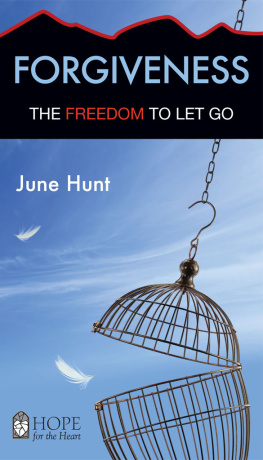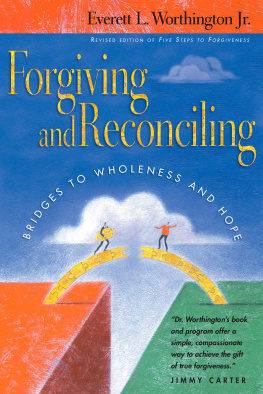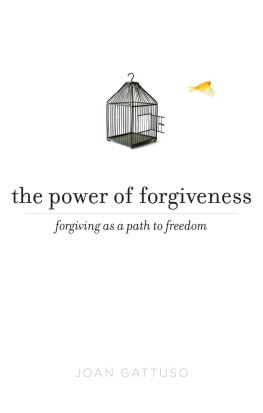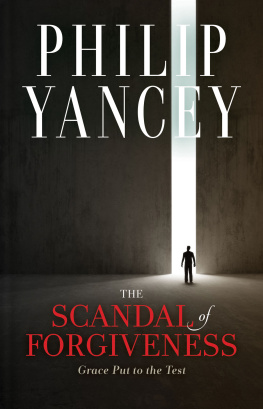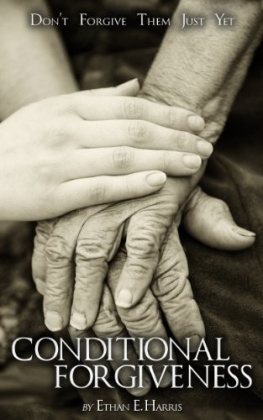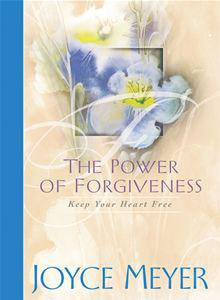Many thanks to Robyn Heisey, Jill Rogers, Valerie Cooper, and everyone at Red Wheel/Weiser. Thank you for offering me the opportunity to explore forgiveness and to revisit the incidents in my own life that needed a bit more reflection.
May you live your lives joyfully.
Preface
Several years ago, I was browsing in a local shop and found a basket filled with pewter stones less than an inch long. Each tiny fragment was etched with Chinese characters on one side, with the English translation on the reverse. I began to read the inscriptions but there were so many that I gave up, closed my eyes, and randomly chose four stones. What they said would be a surprise and perhaps an inspiration for me. The four stones read: courage; patience; forgiveness; and gratitude. At first, I didn't sense a connection between them. I simply placed the talismans on my home altar and when I dusted the area, I picked up the stones, enjoying the feel of their smoothness and coolness as they lay in the palm of my hand. Then I would read the words. Sometimes it seemed that one or another of them reflected what was going on in my life, or offered encouragement.
Eventually I realized that the words were connected in a very meaningful way. For quite a while, I had been holding on to a resentment and it was difficult to let the anger go and forgive. I needed to be aware of my sense of outrage when the memory of the situation arose or when someone mentioned the guilty party's name. I had to take the resentment into my meditation and be willing to explore it. It was necessary for me to notice how my body tensed and how my stomachlurched when the wounds were reopened; how my neck became stiff and my teeth clenched and my chin jutted forward when the feeling of being wronged surfaced.
It took courage to decide to detach from the story of why I was angry, the unfairness of the situation, and dreams of revenge.
It took patience to sit through many meditation periods that weren't filled with peace, but were hard work. I wasn't ready to forgive (and certainly not to forget), and that took patience as well. I had to be willing to forgive myself for not being able to forgive. But eventually the hard work paid off, and one day, when I was concentrating on the tightness in my shoulder where the resentment resided, it vanished and I was able to forgive and wish the other person well from the bottom of my heart. Immediately I was filled with immense gratitude for my life. So I could see how courage, patience, forgiveness and gratitude were entwined.
One of the meditations that I teach is Metta (loving-kind-ness). The goal is to open our hearts to unconditional love. We begin with ourselves, then move on to a benefactor/mentor, a dear friend, a neutral person, and finally the enemy, or difficult person. Eventually we radiate loving-kindness to all beings.
But this is not as easy and joyful a task as it would seem.
Many of us get stuck when we try to open to unconditional love, so a forgiveness practice has been given to us. This book is based on these three forgiveness phrases:
For all the harm I have done to others, knowingly or unknowingly, forgive me.
For all the harm others have done to me, knowingly or unknowingly, I forgive you as much as I can.
For all the harm I have done myself, knowingly or unknowingly, I forgive myself.
During my work with cancer, AIDS, psychiatric, and Alzheimer's patients; with battered women, caregivers, jail inmates, addicts, as well as so-called normal people, I have found that nothing is more difficult than forgiveness. Some people cannot ask for forgiveness, some cannot forgive another, some of us don't even realize that we are our own harshest judge and withhold forgiveness from ourselves.
In this book, we will reflect on what forgiveness really means and how it can heal our lives and relationships. We will explore the difficult emotions that keep us from forgiving and learn to work with them through meditation, guided imagery, and exercises. We will discover that a forgiving heart is a loving heart.
1
Heart of Forgiveness
Forgiveness is the final form of love.
Rheinhold Niebuhr
It may be difficult to define forgiveness, but it is almost impossible to define love. We bandy the word about, sometimes using it to express our deepest emotion, sometimes using it lightly. A mother may say to her baby, I love you. In the heat of a romantic tryst you whisper, I love you. You receive a sweater for a gift and exclaim, I love it! The words are the same, but the meaning is different. What do you mean by love?
Practice: Exploring Love
Take a piece of paper and a pencil, and draw two columns. In the left column, list all the things (not people) you love. Keep going until nothing else occurs to you. In the second column, list the things you love the least.
Can you find any similarities between the two lists?
Why do you love one thing and not another?
In doing this exercise, you might discover that the items are just things. What makes us love one thing and hate another is simply personal preference. You may love hard rockmusic and hate rap. I may love rap and hate hard rock. There is nothing especially lovable about either. So our love is conditional.
Love is also changeable. As time goes by, you may tire of rock and prefer golden oldies. If you become deaf, you may not love music at all.
A while ago, my sister and I were reminiscing and rooted out family photograph albums. As we turned the pages, we began to laugh at the clothes we had chosen to wear when we were teenagers: Lorraine in her black Capri pants, fuzzy sweater, and dangling earrings; me in a madras wrap-around skirt with round-collared blouse and circle pin. In those days, we had each thought we were the epitome of style. But over the years, our tastes had changed; we had outgrown our outfitsin more ways than one! So when we say we love something, it is not absolute.
Turn the paper over and make two new columns. Begin to list the names of people you love. Keep going as long as names pop up, but when you have to search your memory, stop. In the second column list the people you love the least (dislike, hate) until you run out of names.
Now ask yourself these questions, first about the people in column one, then in column two.
If you borrowed money from me and never paid it back, would I forgive you?
If you belittled me in front of my friends, would I forgive you?
If you physically harmed me, would I forgive you?

